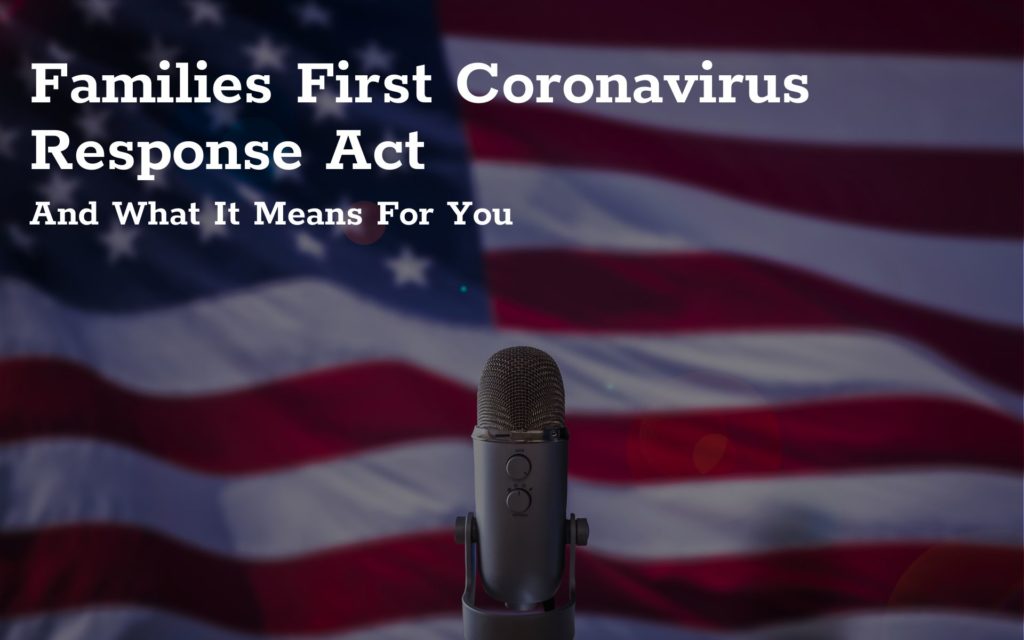
What Does the Families First Coronavirus Response Act Mean for You

Signed on March 18, 2020, and in effect as of April 2, The Families First Coronavirus Response Act (FFCRA) extends tax relief to employers and paid sick leave during COVID-19 to certain employees of small businesses. The bill also provides funding to state and government agencies to expand unemployment and nutritional assistance benefits and establish free coronavirus testing.
At the time of publication, The FFCRA was the second of three pieces of legislation passed to address the 2020 coronavirus pandemic.
- March 6, 2020: The Coronavirus Preparedness and Response Supplemental Appropriations Act was signed into law, providing $8.3 billion in emergency pandemic response funding.
- March 18, 2020: The Families First Coronavirus Response Act was signed into law to address some of the economic impacts of the pandemic.
- March 27, 2020: The Coronavirus Aid, Relief, and Economic Security Act (CARES Act) was signed, providing, among other things: direct payments to many Americans; relief funds to the medical industry; loans to help support small businesses; and expanded unemployment payments and access.
Who is covered by the Families First Coronavirus Response Act?
Eligibility for Emergency Sick Leave or Expanded Family Medical Leave under the act is contingent on your employer. Many Americans will qualify for benefits under the Act. However, those who work for large businesses (those who employ more than 500 workers) and most federal government employees are not covered. If your employer is not included in the legislation, you may still qualify for regular FMLA leave or paid sick leave under existing state law.
Certain self-employed individuals may also be covered, and could receive their benefits in the form of tax credits.
Under what circumstances do I qualify for paid sick time or expanded leave under the Families First Coronavirus Response Act?
If there are fewer than 500 employees in your company, you may qualify for Emergency Paid Sick Leave and Expanded Family Medical Leave under the Act.
Emergency Paid Sick Leave
Employees of small businesses with fewer than 500 employees are eligible to receive paid leave benefits if they meet certain conditions. Employers are not required to provide this benefit to emergency responders and healthcare workers.
- Workers may receive emergency paid sick leave if they:
- Are subject to quarantine orders at the federal, state, or local level due to COVID-19; or
- Have been advised to self-quarantine by a healthcare provider due to COVID-19; or
- Have symptoms of and are seeking a diagnosis for COVID-19; or
- Are “experiencing any other substantially-similar condition specified by the Secretary of Health and Human Services, in consultation with the Secretaries of Labor and Treasury.”
- Workers may receive emergency paid sick leave if they:
- Are providing care for a family member subject to state, federal, or local quarantine;
- Are caring for a family member experiencing symptoms of and seeking a diagnosis for COVID-19; or
- Are providing care for a child under the age of 18 whose child care provider is closed or unavailable or whose school is closed due to COVID-19.
Paid and Expanded Family Medical Leave
If your employer is subject to the Act, you may qualify to receive expanded family medical leave for up to 10 weeks in addition to paid sick leave. Eligible workers may request job-protected leave under the FFCRA if they have been employed for more than 30 days and are caring for a child under the age of 18 due to COVID-19 related school or childcare closures. Employers are not required to provide this benefit to emergency responders or healthcare workers.
How much will I get if I qualify for the Family First Coronavirus Response Act?
If you qualify for Emergency Paid Sick Leave, your payments will be calculated based on your normal rate as well as the reason for your leave.
| If you are… | You qualify for… |
| Taking qualified sick leave for your own COVID-19 symptoms or diagnosis; subject to self-quarantine orders from your healthcare provider; or, subject to a state, local, or federal quarantine order. | Emergency Paid Sick Leave at your regular rate of pay (up to $511 per day) for up to 10 days/80 hours for full-time workers. For part-time workers, paid sick leave benefits are based on the average number of hours they would work over a two-week period. |
| Taking qualified sick leave to care for a family member’s COVID-19 symptoms or diagnosis, or to care for a child at home due to COVID-19-related school or childcare closings. | Emergency Paid Sick Leave at ⅔ your regular rate of pay or ⅔ the applicable minimum wage for up to 10 days/80 hours, not to exceed $200 per day. For part-time workers, paid sick leave benefits are for the average hours they would normally work in a two-week period at ⅔ their regular rate. |
| You cannot work or telework due to the closure of your child’s school or the closure or unavailability of your childcare provider due to COVID-19. | Expanded Family Medical Leave at ⅔ your regular rate of pay or ⅔ the applicable minimum wage for up to 10 weeks, not to exceed $200 per day. For part-time workers, paid sick leave benefits are for their average hours worked at ⅔ their regular rate up to $200 per day. |
How do Tax Credits for Employers work?
Small and midsize employers subject to the FFCRA are eligible for federal payroll tax relief and tax credits to offset the costs to their business. These tax credits are meant to reimburse employers, dollar for dollar, for qualifying family leave and employee sick leave payments during COVID-19, as well as qualified insurance and payroll tax costs. In addition to the tax credits available to employers, some self-employed workers may also qualify for a similar coronavirus tax credit program under the Act.
Businesses with fewer than 50 employees may qualify for an exemption from the pay requirements due to closed schools and childcare only if providing this leave would jeopardize a business’ viability.
Conclusion
Families facing economic uncertainty due to the COVID-19 pandemic may find some financial relief in the provisions of the FFCRA, which will allow them to take time away from their jobs to care for themselves or their families. The CARES Act, passed in late March, offers further support to families and small businesses through a combined approach that increases access to unemployment, makes funding available to small businesses through grants and loans, and sends direct payments to qualifying adults. At the time of publication, the White House and Congress had begun discussions on a fourth coronavirus recovery package, which could include additional payments or other provisions to help families and businesses weather the storm.
Our team of dedicated trial attorneys at Antol & Hance, PC, have more than 60 years of combined legal experience and a strong track record of providing successful legal counsel. We have been practicing criminal, family and divorce, drug and DUI, and accident law in Flagstaff, Arizona and surrounding northern Arizona cities including Camp Verde, Sedona, Williams, Holbrook, Winslow, Cottonwood, Mayer, Seligman, Kingman, Page, St. Johns and more for over 30 years. Antol & Hance, PC and their staff of lawyers would love to sit down and discuss your legal needs. Please call us at 928-241-6339, stop in today at Antol & Hance, PC, 150 N Verde St Suite 102, Flagstaff, AZ 86001 or visit us at flagazlaw.com.
